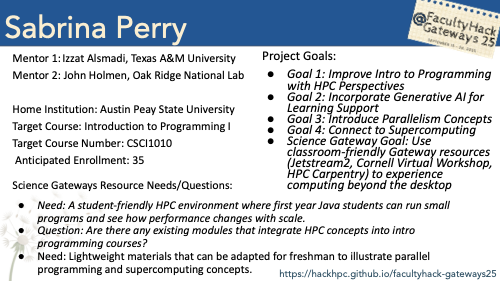Introduction to Programming I (CSCI1010)
Course Description:
Introduces computational thinking and programming foundations. Students practice variables, control flow, functions, arrays, and debugging through structured labs and short projects. Emphasis on readable style, problem decomposition, and stepwise refinement. Frequent formative feedback supports novices while encouraging metacognition and transfer to subsequent computing coursework. Students practice, reflect, and document methods. Prerequisites/Corequisite: None
Project Goal(s):- Science Gateway Goal: Use classroom-friendly Gateway resources (Jetstream2, Cornell Virtual Workshop, HPC Carpentry) to experience computing beyond the desktop
- Goal 1: Improve Intro to Programming with HPC Perspectives
- Goal 2: Incorporate Generative AI for Learning Support
- Goal 3: Introduce Parallelism Concepts
- Goal 4: Connect to Supercomputing
Faculty Member:
- Sabrina Perry
Austin Peay State University
Mentors:
- Izzat Alsmadi
Texas A&M University
- John Holmen
Oak Ridge National Lab
Research Methods and Data Analysis (CPAD 503)
Course Description:
Develops applied research design and data analysis skills for graduate study. Covers measurement, sampling, ethics, reproducible workflows, visualization, and statistical modeling in R or Python. Students design studies, manage data, implement analyses, and communicate findings using transparent documentation and version control. Students practice, reflect, and document methods to consolidate learning. Prerequisites/Corequisite:Graduate standing or instructor consent; prior statistics exposure recommended; familiarity with R or Python beneficial.
Project Goal(s):- Goal 1: Use R & Python
- Goal 2: Learn supervised and unsupervised learning
- Goal 3: Be familiar with jetstream2
- Goal 4: Create reproducible projects
Faculty Member:
- Oyebade Oyerinde
Clark Atlanta University
Mentors:
- Anas AlSobeh
Southern Illinois University Carbondale
Ecology (SBIO 404 B)
Course Description:
Focuses on essential concepts and applied practice. Students complete structured exercises and projects to build conceptual understanding and practical fluency. Instruction emphasizes reproducible workflows, feedback-driven improvement, and clear communication of results to technical and non-technical audiences. Students practice, reflect, and document methods to consolidate learning. Students practice, reflect, and document. Prerequisites/Corequisite:Related foundational coursework and instructor consent may apply
Project Goal(s):- Science Gateways Goal: Incorporate the use of EcologyPlus and PlantScience
- Goal 1: Enhance the quality of the information being presented by Introducing students to a new way to visualize Ecological data using the SGX3 resources.
- Goal 2: Introduce students to new and impactful Generative AI and resources for science
- Goal 3: Revise my Ecology course to include the science gateways resources.
Faculty Member:
- Mary Beals
Southern University A&M College
Mentors:
- Mohammed Elmellouki
Mississippi Valley State University
- Troy Wooton
Chaminade University
General Biology (412)
Course Description:
Builds foundational biological literacy emphasizing cell structure, genetics, evolution, and physiology. Laboratory experiences reinforce inquiry, data recording, and analysis. Instruction integrates case studies and authentic datasets to connect concepts with real-world systems and health. Focus on scientific reasoning, quantitative skills, and effective communication of evidence. Students practice, reflect, and document. Prerequisites/Corequisite: Introductory biology background recommended; concurrent or prior lab as specified by the department.
Project Goal(s):- Goal 1: Introduce students to a new way to visualize plant physiology data using the SGX3 resources.
- Goal 2: Enhance engagement in the classroom.
- Goal 3: Incorporate AI for learning support for students in majors biology.
Faculty Member:
- Tanganika Johnson
Southern University and A&M College
Mentors:
- Olabisi Ojo
Albany State University
- Fernando Posada
Oak Ridge National Lab
GPUs for Massively Parallel Mechanistic Modeling
Course Description:
Explores parallel architectures, programming models, and performance reasoning. Students implement and analyze parallel algorithms on CPUs and GPUs, emphasizing decomposition, synchronization, and scalability. Topics include shared and distributed memory, threading, vectorization, profiling, and correctness. Projects connect theory to practice using contemporary toolchains and reproducible workflows. Students practice, reflect, and document. Prerequisites/Corequisite: Data structures and algorithms; proficiency in C/C++ or Python; prior systems or architecture course recommended; calculus/linear algebra helpful.
Project Goal(s):- Goal 1: Setup student JetStream2 VM for homework, capstone projects.
- Goal 2: Add students to my ACCESS group for cluster runs, help them get their own ACCESS allocation.
- Goal 3: Teach all C++ classroom exercises inside a web IDE.
- Goal 4: Train students to package their project.
Faculty Member:
- Pariksheet Nanda
University of Pittsburgh
Mentors:
- Elijah MacCarthy
Oak Ridge National Laboratory
- Qimora Mason
Elizabeth City State University
Intro to Programming (CMP 224)
Course Description:
Introduces computational thinking and programming foundations. Students practice variables, control flow, functions, arrays, and debugging through structured labs and short projects. Emphasis on readable style, problem decomposition, and stepwise refinement. Frequent formative feedback supports novices while encouraging metacognition and transfer to subsequent computing coursework. Students practice, reflect, and document methods. Prerequisites/Corequisite: No prior programming assumed; math placement or quantitative readiness recommended.
Project Goal(s):- Science Gateway Goal: Introduce students to SGX3 resources (Jetstream2)
- Understanding Core Programming Concepts: Students will grasp essential programming principles such as variables, data types, control structures (loops, conditionals), functions, and basic data structures (arrays, lists).
- Developing Problem-Solving Skills: Students will learn to analyze problems, create logical algorithms, and translate solutions into code, fostering critical thinking and computational reasoning.
- Writing Clean, Efficient Code: Students will practice coding with clarity, proper documentation, and organization, emphasizing best practices for readability and maintainability.
Faculty Member:
- Cheryl Swanier
Voorhees University
Mentors:
- Alexander Fields
Texas Advanced Computing Center
- Sajida Faiyaz
Austin Community College
Cyber Security (CMP 431)
Course Description:
Introduces core cybersecurity principles and practices through hands-on labs. Topics include threat models, authentication, cryptography, network defense, secure coding, and incident response. Students analyze vulnerabilities, implement mitigations, and document procedures, emphasizing ethics, compliance, and operational resilience. Students practice, reflect, and document methods to consolidate learning. Students practice, reflect, and document. Prerequisites/Corequisite: Programming fundamentals and computer networks recommended; discrete math helpful; junior standing or instructor consent.
Project Goal(s):- Science Gateway Goal: 1: Integrate Jetstream2 into modules and assignments. Science Gateway Goal 2 : Simulate more real world scenarios with AI role play using deapsecure , and clark
Faculty Member:
- Joshua Gbadebo
Voorhees University
Mentors:
- La Tasha Roberts
Austin Community College
- John Holmen
Oak Ridge National Lab
Bioinformatics for NGS Data Analysis. (BIOL 522)
Course Description:
Develops applied research design and data analysis skills for graduate study. Covers measurement, sampling, ethics, reproducible workflows, visualization, and statistical modeling in R or Python. Students design studies, manage data, implement analyses, and communicate findings using transparent documentation and version control. Students practice, reflect, and document methods to consolidate learning. Prerequisites/Corequisite: Graduate standing or instructor consent; prior statistics exposure recommended; familiarity with R or Python beneficial.
Project Goal(s):- Science Gateway Goal: Enable students to use Science Gateway tools for big data analysis such as EDGE-Bioinformatics-Gateway , Microbial Genomes Atlas , Searching the SRA
- Goal 1: find out resources for data generation (Financial)
- Goal 2: Feasibility study on applying AI/ML to the course. (Mentors)
- Goal 3: Train students to integrate and visualize results from multiple science gateway platforms.
- Goal 4: Build a sustainable framework for incorporating new tools and datasets into the course.
Faculty Member:
- Feseha Abebe-Akele
Elizabeth City State University
Mentors:
- Mohamed Elbakary
Elizabeth City State University
- Qimora Mason
Elizabeth City State University
Bayesian Stats, Geocomputation (DS 400, DS 422)
Course Description:
Introduces Bayesian inference with applications. Topics include prior elicitation, conjugate models, MCMC, model checking, and decision analysis. Students implement analyses, critique assumptions, and communicate uncertainty with principled visualization and reporting. Students practice, reflect, and document methods to consolidate learning. Students practice, reflect, and document methods to consolidate learning. Students practice,. Prerequisites/Corequisite: Probability and mathematical statistics; calculus; programming experience in R or Python.
Project Goal(s):- Science Gateway Goal: 1: Utilize Github Classroom while still building students professional portfolios Introduce larger datasets to Bayesian Stats & Geocomputation Bayesian Applications in Climate Modeling
- Science Gateway Goal 2: Understand the most efficient ways to work with satellite data (API’s, packages, etc?) The Earth Observing System Data and Information System (EOSDIS) Gateway
- Science Gateway Goal 3: Utilize JetStream virtual machines in class
Faculty Member:
- Connor Flynn
Chaminade University of Honolulu
Mentors:
- Trey White
Oak Ridge National Laboratory









